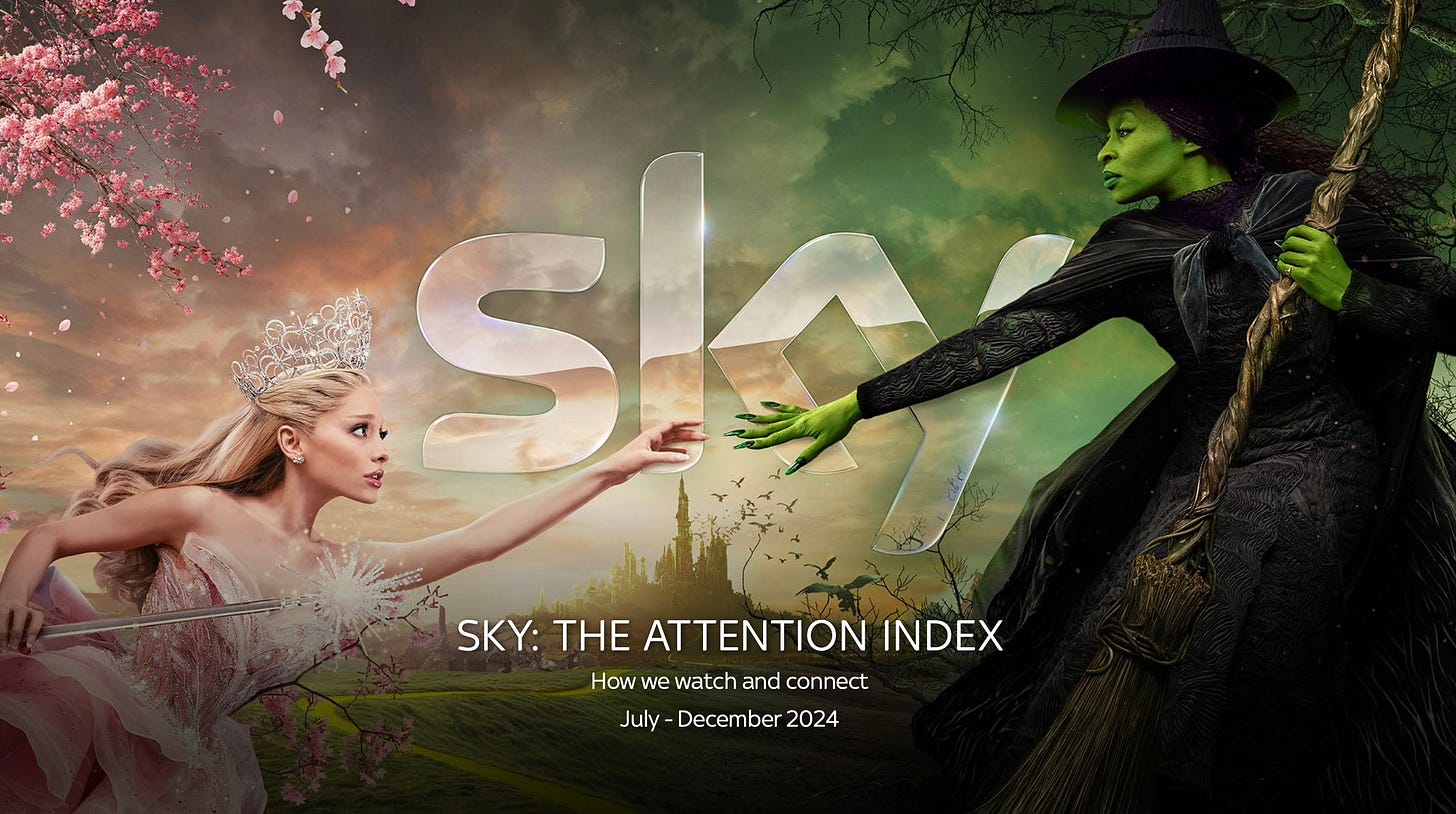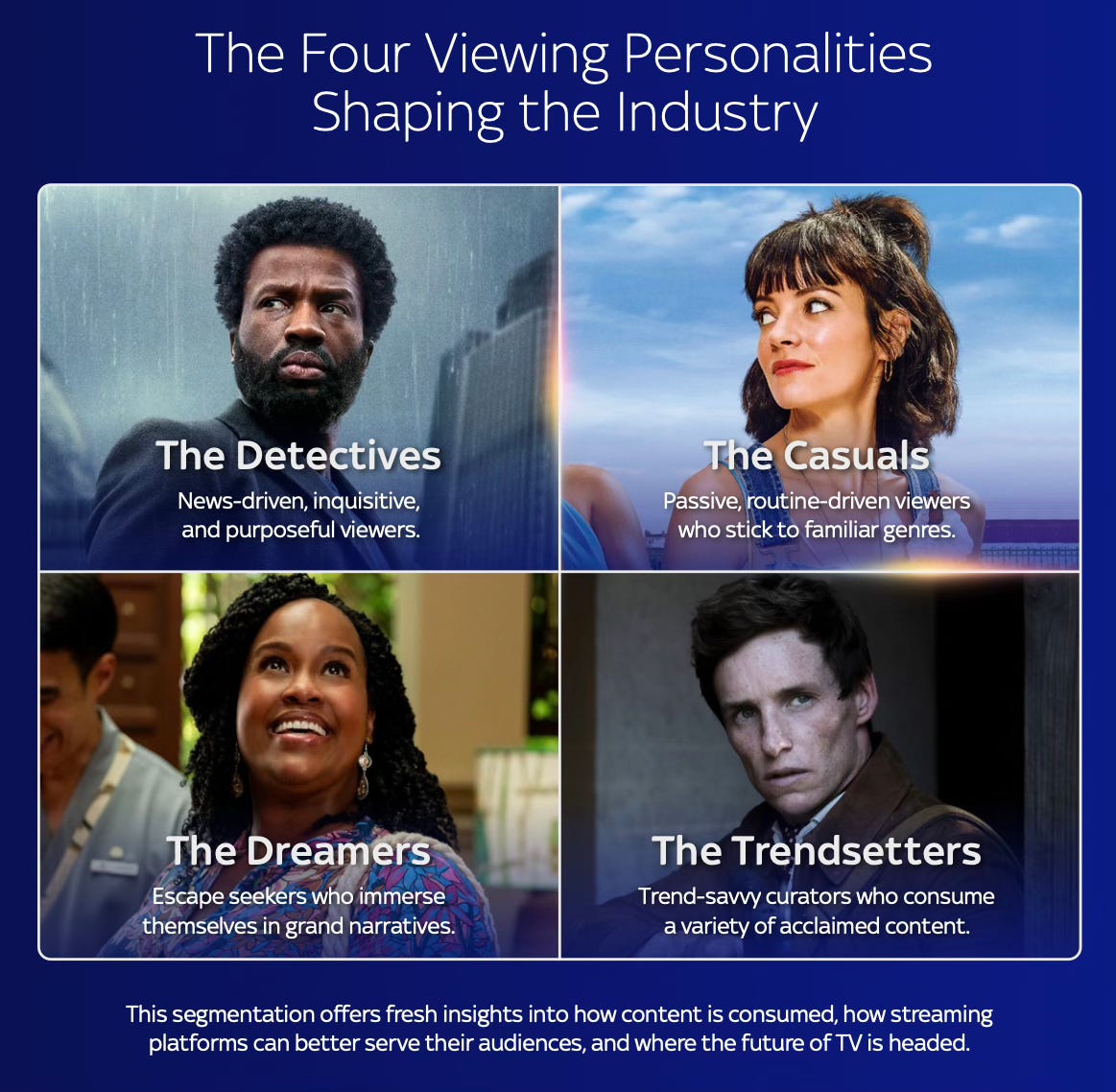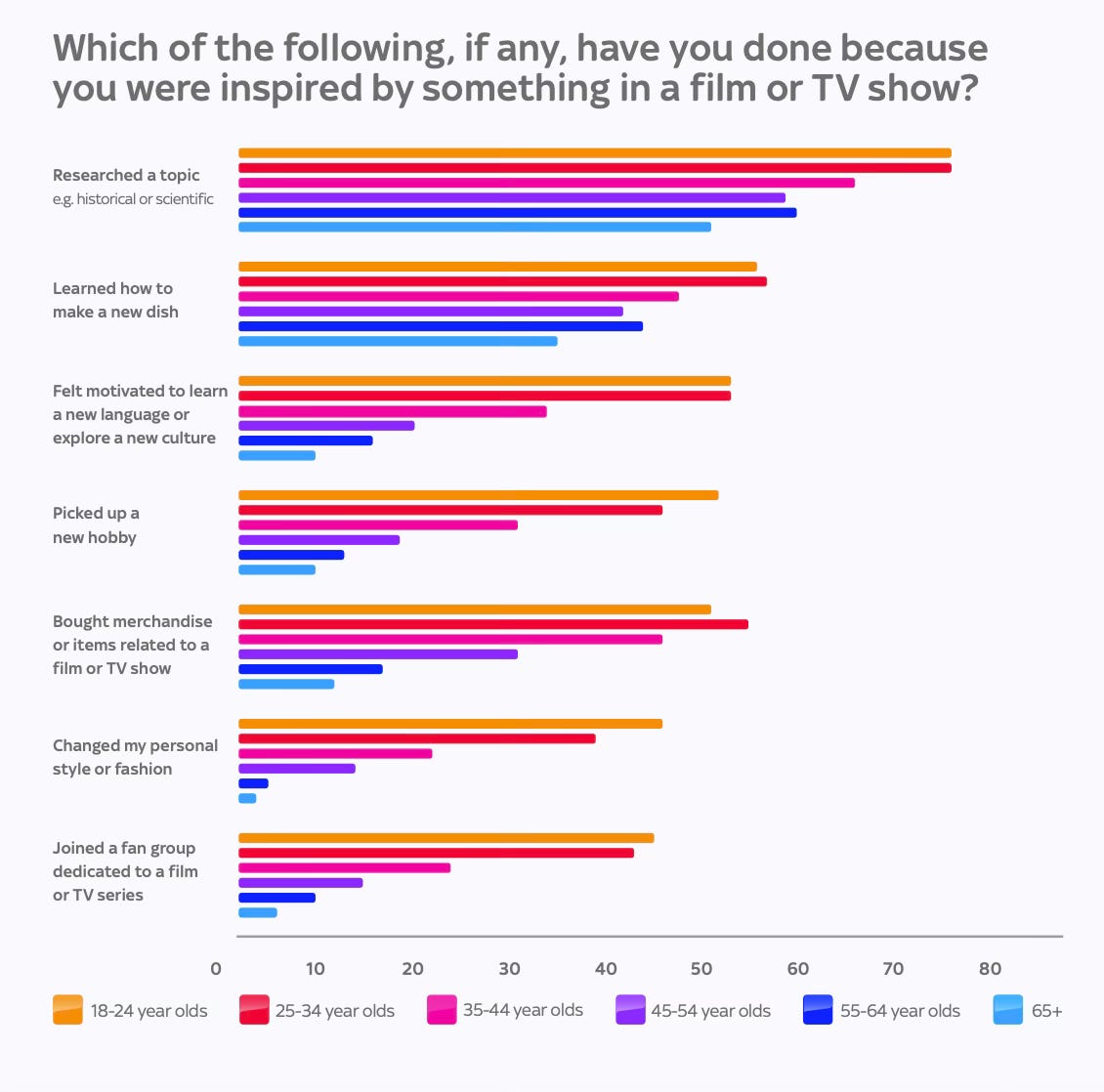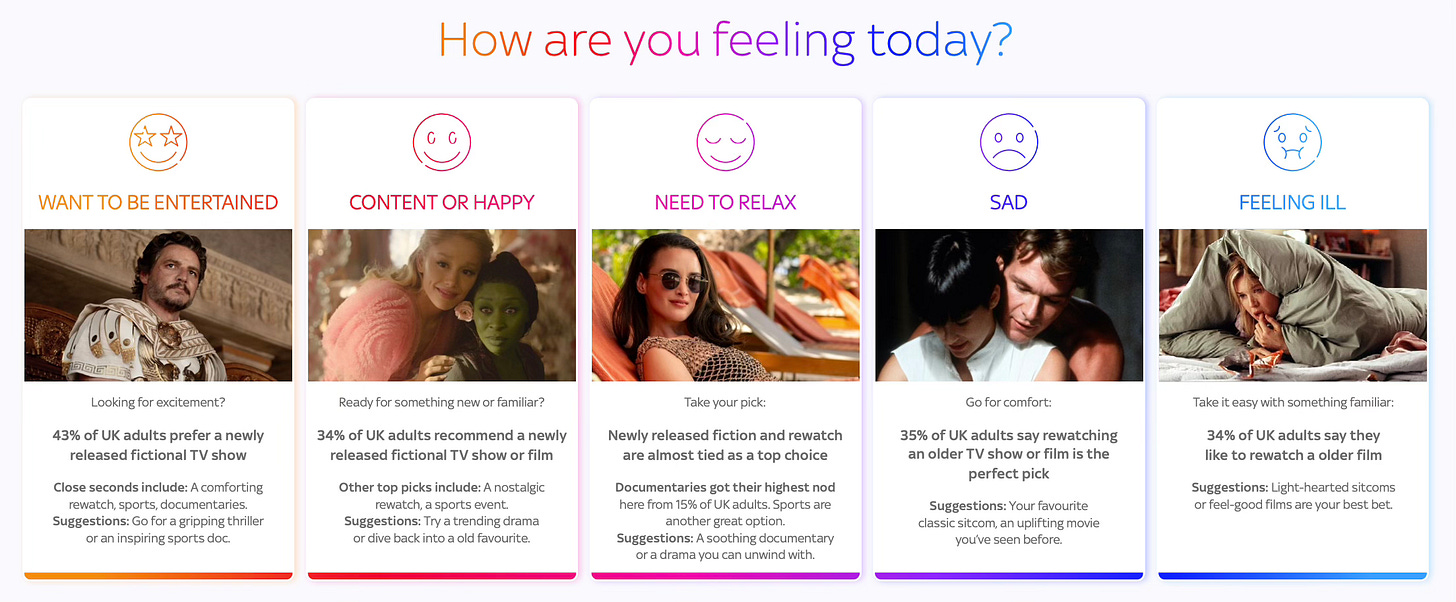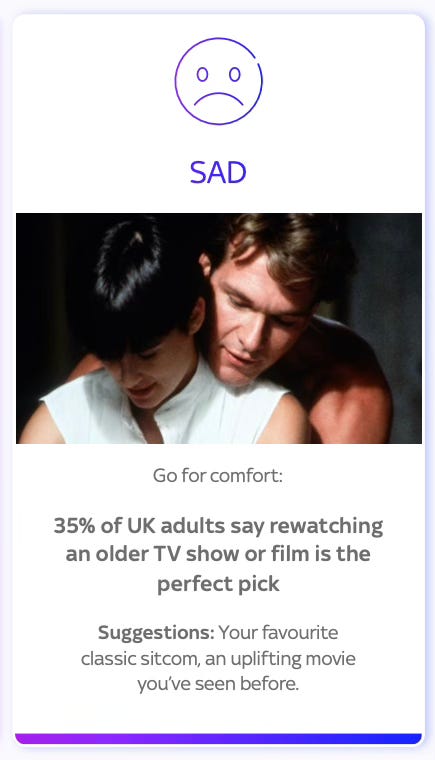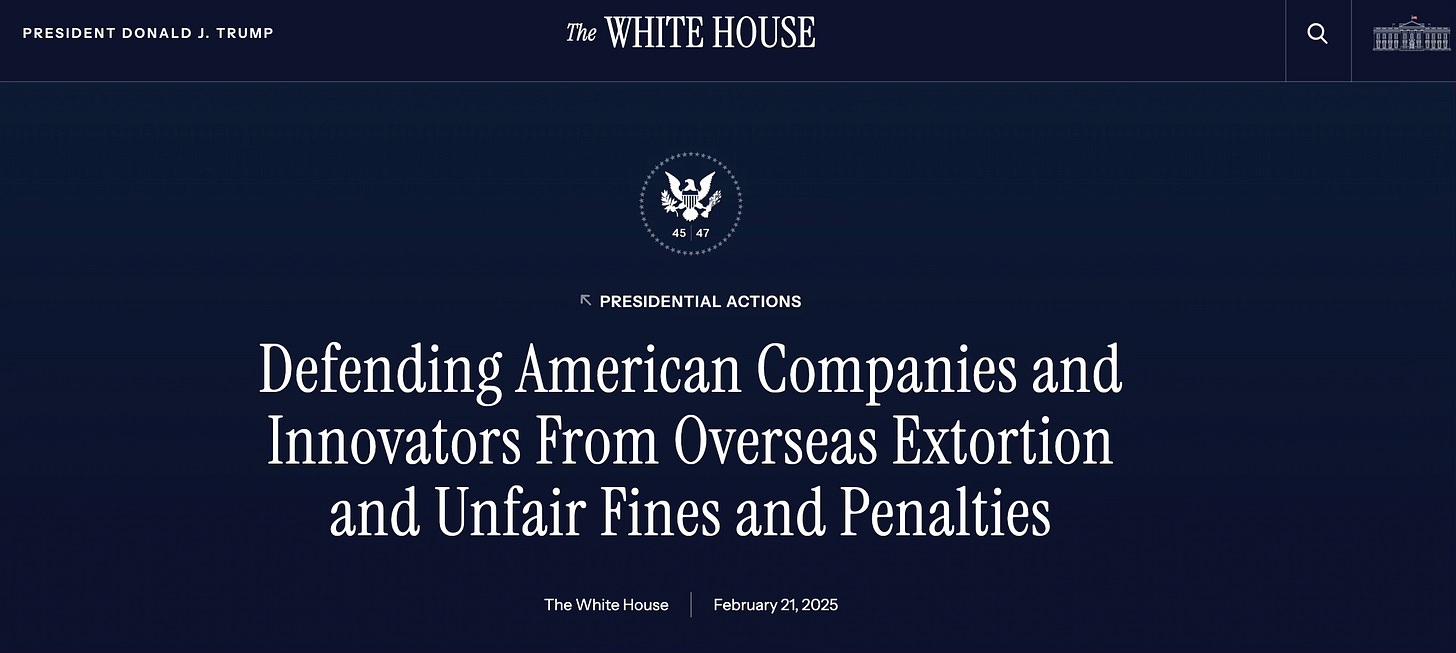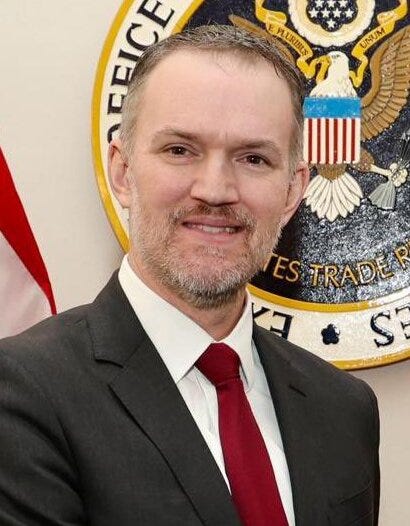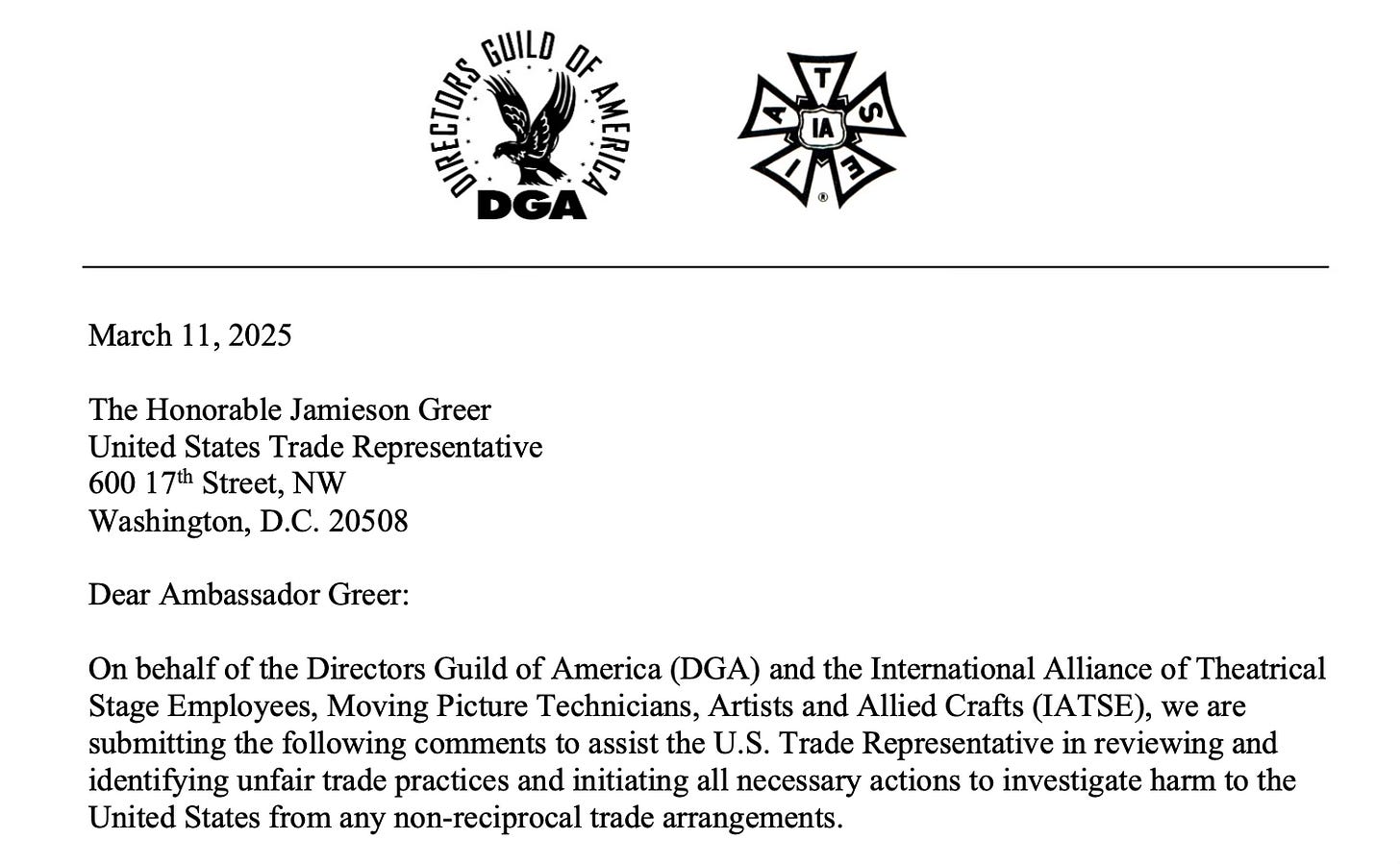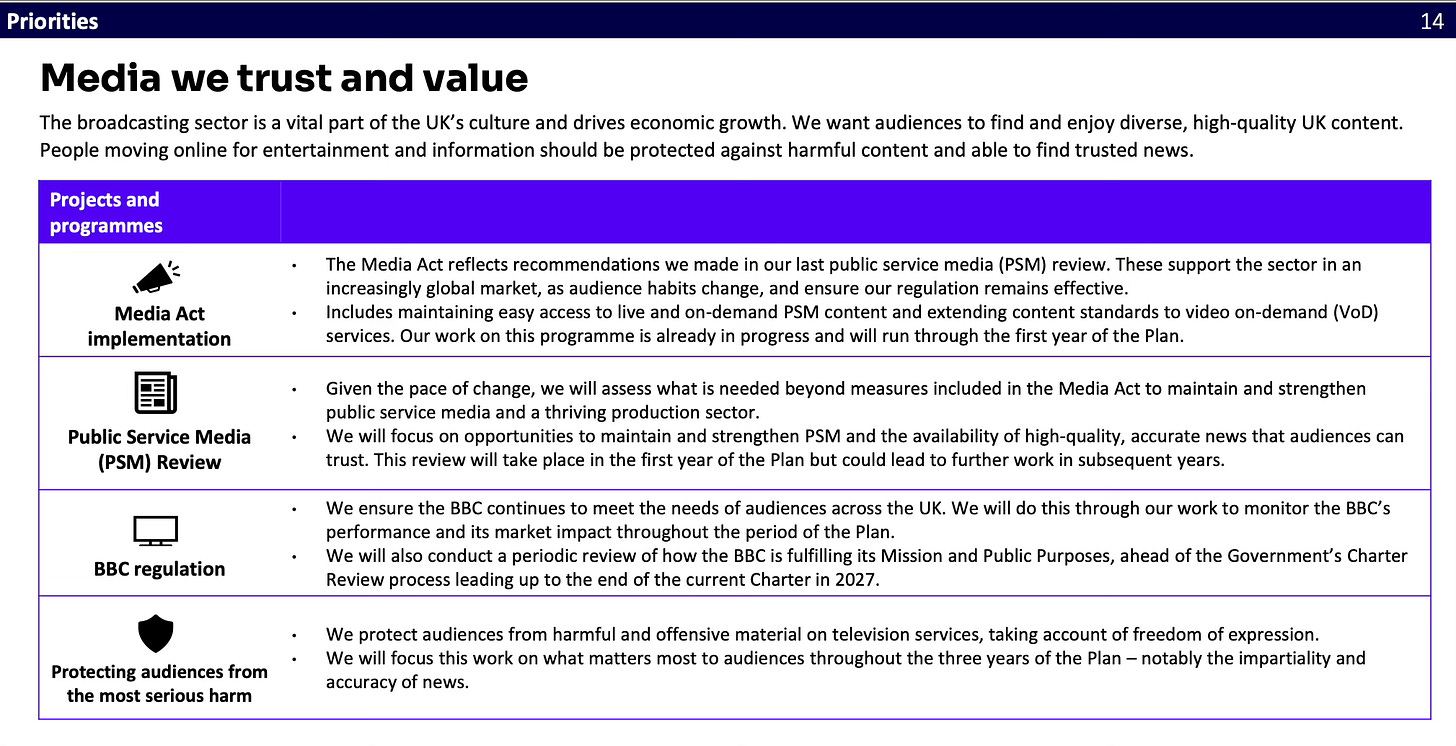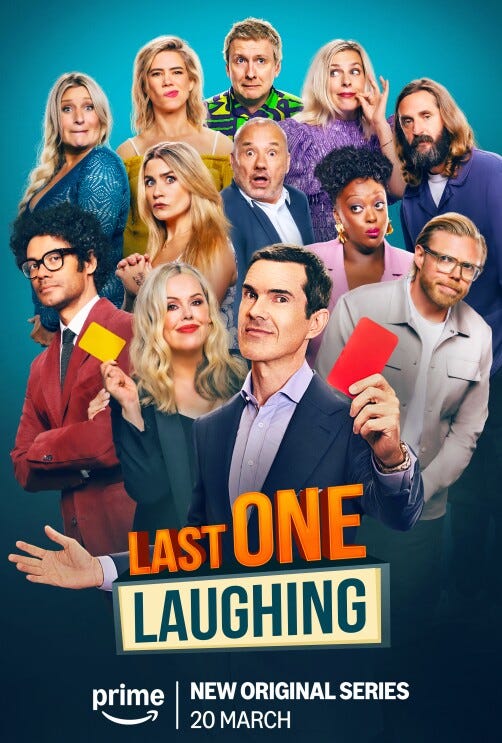First look at new Sky data - and is the streaming levy DOA?
ScreenPower: where TV and Film meet politics and power
Hello and welcome to ScreenPower.
I know it’s only been a week since the last newsletter, but there’s lots going on!
In today’s edition:
👊 1. An exclusive first look at Sky’s new report on viewing habits (there are some surprising results)…
👊 2. Amid calls for a streaming levy in the UK, has the White House killed the idea before it even gets off the ground?
👊 3. And Ofcom reveals its three year plan of action - but what area is it prioritising?
Here goes… 📽️💪💥
1:📈FIRST LOOK: Sky’s latest report on viewing trends
Over the weekend, I was given a sneak peak at Sky’s latest ‘Attention Index Report’ before it gets published today.
Sky launched the index last year as a way to both utilise the viewing data from their millions of UK customers, and track the audience habits and emerging trends that could shape the way we watch TV in the coming years.
Attention please: Sky’s Group Chief Executive Dana Strong says the index is “a comprehensive look at where millions of Britons are placing their attention, and what that means for the future of TV and the future of connectivity in the UK.”
Why is this important? Regular readers will know I’m a big fan of linear television and a believer in the power of broadcast moments to bring people together. But as technology evolves and draws our attention in dozens of directions, those moments are harder to find - so it’s more important than ever for the industry to have a handle on the factors driving changes in viewing habits.
So, what does the report tell us? Here are my key takeaways from the data:
1. The usual demographics aren’t as important as you think
The first thing that surprised me was the finding that “demographics like ethnicity, financial background or even political leanings play less of a role than expected” in shaping viewing habits. According to the report, viewing is far more likely to be driven by what people want in the moment - so Sky have identified three ‘core motivations’:
They’ve then used these ‘motivations’ to establish four distinct viewing personalities that “define how UK audiences in the UK engage with media today” - and then used these viewing personalities to categorise different behaviours and habits.
(I’m a Trendsetter, in case you were wondering).
2. Young people experience the deepest engagement with content
Sky have found that “cross-platform behaviour” by audiences immersed in content “is creating a dynamic environment where content isn’t just consumed—it’s celebrated, critiqued, and shared in real time, deepening the viewer’s overall experience”.
And it’s young people driving these deeper experiences.
The report finds that 18-24 year olds are more likely to pick up a new hobby (50%), change their personal style or fashion (44%), or join a fan group dedicated to a film or TV series (43%) - than any other age group.
3. British people are proud of homegrown screen success
“More than half of UK adults (52%) say they feel proud when British-made content earns international recognition —a sentiment that’s even stronger among Trendsetters, with nearly 7 in 10 (67%) expressing pride in the UK’s success in film and TV.”
This is a useful finding, since it suggests both an awareness of the success of the UK’s screen sector, and potentially support for measures that could strengthen it.
Parts of the TV industry are currently considering asking government for some sort of policy measure to support British-made drama. They’d do well to look at stats like this.
4. More of us are watching TV over the internet
The report finds that we’re consuming data at record levels. Sky Broadband customers used 19.1 billion gigabytes of data in the last six months— apparently enough to stream “the entirety of Charli XCX’s Brat over 193 billion times”.
Charli who? Just kidding. I’m a trendsetter, remember.
It sounds like sports viewing is one of the biggest genres driving this increase. Sky said the biggest spike came on December 1st, “fuelled by a blockbuster day of live sports, including Manchester United vs Everton, Manchester City vs Liverpool, and the Qatar Grand Prix”. I think I was watching Elf.
But the key stat here is that peak data usage jumped 17% since the first half of last year - rising from 24 Tbps to 28 Tbit/s.
17% in a year. That’s quite the leap - and it’s interesting in the context of ongoing discssions between broadcasters and the Governmnent about when to ‘switch off’ digital terrestrial TV transmission.
Another interesting angle in the report: Sky are exploring audience engagement on an emotional level, analysing the viewing choices people make when they’re in a particular mood. The study finds people are less likely to watch new content if they’re feeling sad or ill:
Give me more! Once it’s published, you’ll be able to read the full report here.
2: 🇺🇸 Has the US just kiboshed any prospect of a streaming levy in the UK?
Last week I said it was worth keeping an eye on developments across the pond, and how they might impact the screen industry here.
There have been two key developments - both of which I had missed previously, but have barely been reported. Thank you to the ScreenPower reader who flagged them to me.
1. White House position on streaming levies
In a memo published on Whitehouse.gov last month, the US President hit out at countries that force “American streaming services to fund local productions” - aka streaming levies. Such levies are currently in place in a handful of European countries - and here the BFI is conducting a study to look at the possible consequences of introducing a streaming levy in the UK (check out my piece on the pros and cons of a streaming levy from earlier this year).
Violation: President Trump said such requirements (along with measures affecting other sectors) “violate American sovereignty and offshore American jobs, limit American companies’ global competitiveness, and increase American operational costs while exposing our sensitive information to potentially hostile foreign regulators.”
Put you down as a maybe? He continues…“My Administration will not allow American companies and workers and American economic and national security interests to be compromised by one-sided, anti-competitive policies and practices of foreign governments. American businesses will no longer prop up failed foreign economies through extortive fines and taxes.”
So that’s pretty unequivocal then.
Live issue: But there is a debate going on right now in the UK about whether we should introduce such a levy here - or other requirements on streamers that could be regarded as punitive (e.g. regional production quotas, like those that apply to PSBs). The Chair of the BBC Samir Shah (below) backed this idea in an interview with The Sunday Times a few weeks ago.
Auntie vs Uncle Sam: So does the White House memo kill the idea? Or does it mean the UK Government could use it as a bargaining chip in future trade negotiations? Right now, it’s hard to imagine Keir Starmer’s Government doing anything it knows would be antagonistic to the Trump Administration.
But it does raise the stakes somewhat for the soon-to-be-published report by Parliament’s CMS Committee, which is expected to include at least some mention of a streaming levy - given the number of times it was raised during oral evidence.
2. Unions complain to US Trade Rep about UK ‘barriers’
The second development is a letter from the heads of two big screen unions in the United States - the Directors Guild of America (DGA) and the International Alliance of Theatrical Stage Employees (IATSE) - to the US Trade Representative Ambassador Jamieson Greer (below).
‘Adverse trade practices’: In the letter, dated 11th March, the unions complain of ‘adverse trade practices’ from countries - including the UK - that they say have been impacting the United States’ film industry for decades.
“The United Kingdom, several members of the European Union, and many other countries have erected barriers to the distribution of American-made film and television programs. These barriers not only depress legitimate licensing and sales, but in some cases add insult to injury by redirecting money that should flow back to the United States by trapping it abroad to fund foreign content production, further exacerbating runaway production. This occurs when distributors collecting foreign revenue on our members’ work must siphon off parts of that revenue to pay for productions within foreign countries instead of returning it fully to the United States and to the DGA’s and IATSE’s members.”
Barriers: The letter doesn’t specify what those barriers are in the UK’s case - but it cites France as an example of a country with a levy.
DST: It’s worth saying that the White House memo mentioned earlier focuses largely on the UK’s Digital Services Tax (DST) - a tax I worked on at HMT ahead of its introduction in 2020. The DST was extremely popular here when we first announced it in 2018, but it’s been the focus of intense debate in recent weeks, having caught the attention of the White House (who aren’t as keen on it given it hits some big US multinationals).
Excluded: But the DST applies to social media platforms, search engines and online marketplaces - not streamers.
The British are coming: The union’s letter again singles out the UK when raising the issue of “runaway production” - i.e. US studios choosing to shoot in the UK rather than stay at home (thanks to our attractive tax incentives, highly skilled workforce, state of the art studio infrastructure, and long history of world-leading storytelling):
“Our industry has seen a 40% decline in television production in the U.S. relative to 2022 levels. Contrast this with the United Kingdom, for example, where 65% of the total production costs spent on film in 2024 came from the five major American studios (Disney, Universal, Sony Pictures, Paramount, and Warner Bros.) and three major U.S. streaming platforms (Netflix, Apple, and Amazon) – representing a 49% increase over 2023. While some U.S. states have established their own incentive programs to mitigate runaway production, this piecemeal approach will not achieve significant success in remedying the problem without action at the federal level – including through the elimination of foreign trade barriers.”
What does ‘action at a federal level mean’?: It could be sticks or carrots - or a combination of the two. In theory, the US could introduce a federal film tax incentive, which would be a big move (it’s currently state by state).
Call for evidence: The letter closes by thanking the Ambassador “for soliciting input on this critical issue” - which presumably means the US Trade Rep had requested this information from the unions.
Why would he do that? Perhaps because he was meeting our very own Business Secretary Jonathan Reynolds a week later in Washington, with US Commerce Secretary Howard Lutnick (seen together in the grainy pic below).
The meeting readout says the US team laid out their desire “that any future agreement will lower barriers for American companies” - but it’s safe to assume this issue will come up somewhere in the trade negotiations.
So where does that leave us? As the Chancellor said last week, “the world is changing before our eyes” - so who knows where we’ll be in 6/12/18 months time.
But my main takeaway from the two pieces of evidence above is that any talk of interventions applied to streamers in the UK that could be viewed as punitive - like a levy - will be handled very carefully by our Government over the coming months.
3: 📺 Ofcom’s three year plan for TV
BREAKING: Ofcom - the regulator that oversees broadcasting - published their three year plan on Friday 🥳
Why is this important?
Two reasons:
SCREEN: Because the media landscape is continuing to evolve, and there’s lots in Ofcom’s in-tray that could affect you - either professionally or as a viewer. Plus they have a key role upholding some of the rules and standards that apply to news, which are vital to our democratic system. So no biggie then.
POWER: Because this newsletter covers the relationship between the screen industries and power - and Ofcom has some significant powers.
Also, the next three or four years could be pivotal for British TV. Technological change, the BBC Charter Review, and challenges in domestic production all mean we will be in a different place by the end of the Parliament. So the priorities of the regulator are important.
Here are the three things ScreenPower readers need to know:
⚖️ More action could be needed beyond the Media Act: As part of its Public Service Media Review, Ofcom say that “given the pace of change” they will “assess what is needed beyond measures included in the Media Act to maintain and strengthen public service media and a thriving production sector”.
📰 News impartiality and accuracy is the big focus: Ofcom will focus on “opportunities to maintain and strengthen public service media and the availability of high-quality, accurate news that audiences can trust.” They identify “the impartiality and accuracy of news” as one of the things that matters most to audiences.
🏃♀️Keeping pace: The Media Act requires Ofcom to extend content standards to video-on-demand (VoD) services, by publishing a VoD code (similar to the Broadcasting Code). Ofcom’s three year plan recognises the need to “keep pace with changing technology and audience expectations, with more consistency across linear and on-demand platforms”.
One for the niche crowd: Also, the plan commits Ofcom to “conduct a periodic review of how the BBC is fulfilling its Mission and Public Purposes, ahead of the Government’s Charter Review”. That language - ‘ahead of’ - suggests the periodic review will be conducted before the Charter Review process starts. But my understanding is that the Ofcom part of the process will run into next year - so surely not.
Also, sidebar: The BBC Licence Fee increases this week. The new fee will be £174.50 pa, a rise of £5, in line with inflation, as agreed in the 2022 licence fee settlement.
What the three year review doesn’t say: Is anything about the ongoing saga of whether politicians should be allowed to read the news. But we already know they are soon to launch a review of the outdated rules - so presumably this comes under ‘news accuracy and impartiality’.
Worth saying: It’s right that we apply appropriate scrutiny to public bodies - but it’s worth saying that Ofcom have a lot on their plate right now, also dealing with online safety as well as technological change across telecommunications and postal services, not just the media.
What to watch…
Last One Laughing on Amazon Prime is an unexpected pleasure. It’s a game show where ten comedians have to try not to laugh - while trying to make each other laugh. It’s sort of Big Brother meets your favourite stand-up. It’s also a tight 30 minutes, making it the ideal chaser after something heavy like Adolescence.
The show is a global concept. It started in Japan, and has since been launched in 28 countries.
The first episode starts a bit slowly - so I’d recommend skipping through the bit where everyone enters the house, and pick up where they start the game proper. Once it gets started, it’s good fun.
🎞️ Recommend ScreenPower
Thank you for reading ScreenPower! As ever, do get in touch with any comments or questions on the topics covered in this issue, either by replying to this email or by connecting on LinkedIn.
And if you know someone who might enjoy this - why not forward it to them? It’s free!





